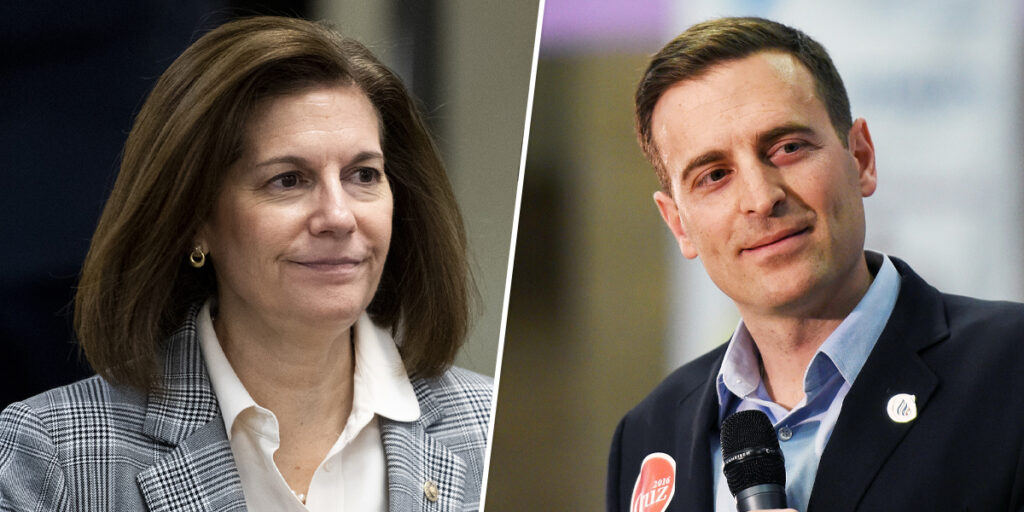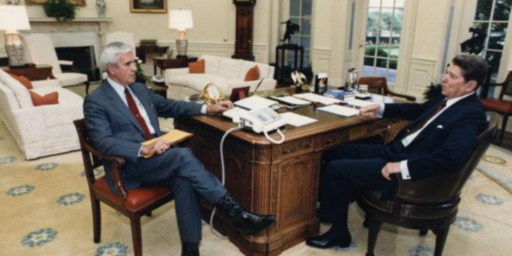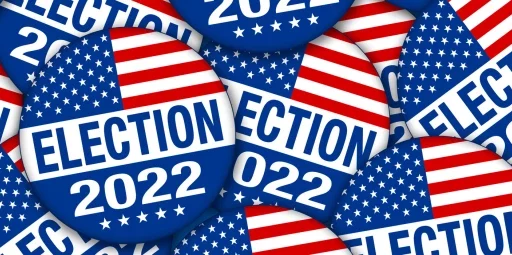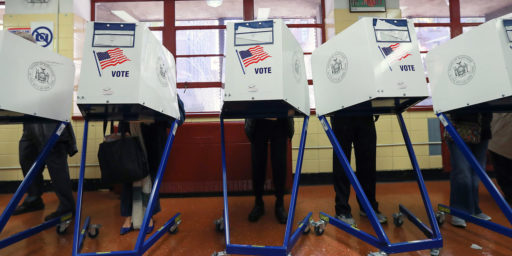Nevada Election Results Could Take ‘Days’
Republicans hold narrow leads for Governor and Senator but . . . .

NPR (“Counting all of the votes in Nevada could take days, election officials say.”):
Overwhelmed election officials in Nevada say that they have been flooded by thousands of mail-in ballots, and that it may take several days to count the votes and upload results.
Last year, the state began requiring that mail-in ballots be sent to every registered voter. While ballots must be postmarked by Election Day, they can be counted if they arrive as late as Saturday.
Elections officials have emphasized the need for patience and have not offered predictions on how quickly they will be able to offer tallies.
Jamie Rodriguez, the interim registrar of voters in Washoe County, said she was expecting roughly 16,000 mail-in ballots to arrive on Election Day. She said that those votes would not be counted until Thursday because poll workers were so behind.
“Understand that whatever results posted tonight, if there are close races, there are definitely still a large number of votes to be counted,” Ms. Rodriguez said on Tuesday night.
And even the results that have come in came slowly. Nevada does not post its results until the last voter in the state casts a ballot, and the polls did not officially close until after 9 p.m. local time. Tallies did not start coming in until late Tuesday, after many contests on the East Coast had already been called.
In an ideal world, voters would have been prepared for this likelihood well in advance and candidates from both parties would be reassuring them that this is simply normal in close contests. We do not live in that world.
Thus far, both of the Senate candidates are acting reasonably:
Long waits and continuous warnings from elections officials did not prevent the candidates in a competitive race for a Nevada Senate seat from projecting confidence about their standing. Early Wednesday morning, Senator Catherine Cortez Masto, a Democrat, was slightly behind her Republican opponent, Adam Laxalt.
“We have a lot of our votes coming in all across the state, yet to be tabulated,” Mr. Laxalt said on election night at a party in Las Vegas. “We are going to win this race.”
“We had people voting in the snow and then the rain because they want a better Nevada and a better America,” he added. “Unfortunately, we’re in for a long night and maybe a few days into this week as all the votes are tabulated.”
Ms. Cortez Masto was also upbeat, but made the situation clear: “We won’t have results for several days.”
But I have little confidence Laxalt will go quietly if the mail-in votes slowly erode his lead—which is the way to bet. While Laxalt’s grandfather, the late Senator Paul Laxalt, was a relatively moderate Republican and maintained good relations with Democrat Harry Reid, who he beat to win the seat and who went on to win it after he retired, the younger Laxalt helped file lawsuits falsely claiming the 2020 election was stolen from Donald Trump. If he’s willing to do that for Trump, one suspects he’ll do the same for his own interests.
Even aside from the anti-democratic tendencies of one of our two major parties, it’s just absurd that a modern country can’t count votes faster than this. If mail-in balloting is going to be the norm, then the deadline for returns needs to be moved up so they can be counted by Election Day.
Now, it’s true that some states have intentionally contributed to the problem. While many allow election officials to verify—and in some cases, tabulate—mail-in ballots as they come in, some require that they wait until after Election Day. That makes delay inevitable and practically invites distrust in our system.
Beyond that, we should almost certainly dispense with the practice of releasing partial results as they come in. Because precincts naturally vary in propensity to vote for candidates of one party or the other, the early returns are often not at all indicative of the state-wide result. But human nature is such that those whose hopes are raised when their preferred candidate has a large lead will suspect chicanery when it evaporates at the 11th hour—much less days later.






I think the Election Day postmark rule is good — it removes the vagueries of post office speed from the process, and ensures votes get counted. Throwing out votes does not improve confidence in the system.
(Plus, as a last minute mail voter, I really enjoy watching the close races slide a bit in my direction.)
It can–just look at Florida, as they do a very good job of handling mail-in ballots. This is about policies and procedures more than anything else.
Although I would stress that having to wait a few days really isn’t that big of a deal.
I would also add: a close race is going to result in a longer wait.
Just as an international comparison which may, or may not, be of interest.
In UK postal votes are counted along with all others.
If your ballot is excluded because it didn’t arrive in time: tough.
Should have posted it earlier.
Anyone may request a postal ballot; average 17% do, IIRC.
I just wanted to add something…
We’ve had enough elections with mail in voting that the only people who are thinking it is fraud when things shift are idiots and liars.
Too many states count mail in ballots last or next to last prior to provisionals. Mail in should be counted concurrent with in person ballots, even if that means the ballots are processed during the voting day, i.e. removed from the mailing envelope and whatever verification procedure that is conducted has been completed.
Brazil knew the results of a very close election within hours of the polls closing, of course their election has been fully computerized and there are no paper ballots to contend with.
I will add that in Pennsylvania (and Wisconsin, I believe), Republicans in the State Legislature have prevented the mailed ballots from being counted before election day.
@Sleeping Dog:
Mail-in ballots should be counted as they come in, and the numbers not released until the election is over.
@Moosebreath:
Yeah. Mail-ins were being tabulated last night by election workers. It was weird… The folded mail-ins wouldn’t go through the scanner properly (I think I heard that they jammed), so each one was opened, and two workers filled out a new ballot (exactly the same as the mail-in), and then that “new” ballot was scanned. The mail-ins went into an envelope to be preserved.
To prevent double-counting, the mail-in and new were both assigned the same number.
Oh c’mon James, the answer is simple: Educate the voters about the process and what can be expected. Those with a propensity for “distrust in govt” are never going to accept any results they don’t like, no matter what. The rest of the electorate will know that if they vote on Tuesday, they will get results on Friday.
Americans really need to grow the F up and stop expecting instant gratification.
I take it none of you have had to take a large hand payment for a jackpot in Vegas*. It doesn’t take days, but it takes a good long while. And it’s inadvisable to move from the machine that paid off, even if you’re done playing and don’t have, or don’t care about, any of your bankroll left in the machine.
It’s how the state is.
*I haven’t, either. My largest was $200. That’s paid in cash and does not require an IRS form. But I’ve seen it happen to strangers, heard stories from friends and acquaintances, and waited with a friend once.
@Sleeping Dog:
UK elections are entirely paper.
It’s quite rare for any constituency to take more than 12 hours to count its votes in a general election ; IIRC the average is around eight hours.
This is FUD: the GOP is going out of there way to slow the counting of mail in ballots and then complaining that it takes to long:
Philadelphia vote count faces delays after GOP challenge
@Stormy Dragon:
e.g. in Pennsylvania, they can’t start counting mail votes until AFTER the polls close on election day and they can’t even start the pre-canvassing process until the morning of election day.
@JohnSF:
A reminder that UK ballots include far fewer offices that require to be tabulated.
@JohnSF:
It should be noted that we vote for a lot more than just seats in office.
A sample of what was on the ballot in Wisconsin. Those are all just within ~100km of our state capitol (the area served by the OTA TV news station).
@Kathy:
True; as I’ve remarked myself here on occasion.
Maximum posts I’ve voted for at any one time was two, when EU and UK local elections coincided in 2004; and general and local in (IIRC) 1979.
But that was handled by having separate ballot papers; general vote was prioritised.
US maybe could do something similar; separate ballots for national and for state/local, and prioritise the national?
IIRC US is bit of an outlier among democracies in the number of votes it tries to handle simultaneously.
Other federal systems might give it a run, I suppose: India, Canada, Australia, Germany.
Paging comparative voting methods experts…
@Mu Yixiao:
Yes, see reply to Kathy above.
Unfortunately the link fails: “451: UNAVAILABLE DUE TO LEGAL REASONS”
Have I been bad again? 😉
@JohnSF:
My own theory on why the US votes on so many things is that the Founding Fathers disliked direct democracy intensely and moved the actual decision making as far from it as possible. The people never forgave them, and have been demanding to vote on more and more things ever since. Also, more and more checks that the ballots are being counted accurately, since there’s a long history of cheating*.
Another factor in the complexity is that US state elections — there’s no such thing as a national election — have always been underfunded and struggled to attract volunteers. Too many voters per polling place, worst in areas with high growth rates. Combine the two and there’s a constant push for automation and the added complexity that comes with that just to keep the system staggering along.
* Wholesale cheating, not retail. Cheating by individuals has never been effective. Cheating by the election officials has. One of the reasons that contemporary vote by mail systems receive such high marks on security is that they are designed to make wholesale cheating much harder.
@Mu Yixiao: I agree in principle, but good luck with plugging the leaks among the people in charge of compiling the data.